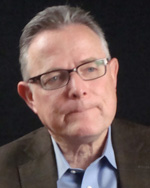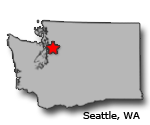
David Boardman
Executive Editor
David Boardman is Executive Editor and Senior Vice President of The Seattle Times with oversight and responsibility for the news department and seattletimes.com. Under his leadership, The Times won the 2010 Pulitzer Prize for breaking news, presented for print and online coverage of the assassination of four police officers.
Boardman is secretary of the Board of Directors of the American Society of News Editors and a past president of Investigative Reporters and Editors. He is a graduate of the Medill School of Journalism at Northwestern University and has a graduate degree from the University of Washington.
[WA 0201] - Part 1: Intro and Contribution (6:12)
David Boardman, executive editor, The Seattle Times, started at the newspaper in September 1983. Boardman says The Times “is the town square of this community. It’s one of the last places in our society that brings people of different beliefs, different perspectives, different interests, [and] different backgrounds together … to have some shared foundation of knowledge of what’s happening in the world. Some place to see and absorb different perspectives and different ideas that they didn’t come to the newspaper with.” Boardman also says The Times “has a great tradition of investigative and watchdog journalism.”
[WA 0202] - Part 2: Ethics & Digital Content (10:07)
David Boardman, executive editor, The Seattle Times, says, “We’ve tried to add ethics as a process.” According to Boardman, the latest ethical challenge, with blogs and social media, is defining “where’s that line between the professional and the personal.” “On the Internet, it has always been a race between speed and accuracy,” says Boardman. But “we are not willing to a sacrifice accuracy.”
[WA 0203] - Part 3: Newsroom Innovation (10:15)
David Boardman, executive editor, The Seattle Times, says for the first part of its existence, The Times website was “the newspaper online.” He says there was an intentional wall between the newspaper reporting staff and the website news staff. But about five years ago, Boardman says, “We started to pound holes in that wall.” Recently, The Times has further reorganized to create three organizational units – content creation, content curation, and community content with three news managers to oversee the merging of print news and all the new electronic platforms the newspaper employs. Watch this interview to learn the details.
[WA 0204] - Part 4: Strategic Changes (4:35)
David Boardman, executive editor, The Seattle Times, says competitively The Times, in past years, had taken a more “second-day approach to news.” But now, leveraged by the Internet, it is emphasizing breaking news. This change was demonstrated in winning the 2010 Pulitzer Prize for breaking news coverage. In November 2009, when four Lakewood, Wash., police officers were gunned down, The Times responded quickly and “all the training we had done – all the discussions we had about handling sensitive material – worked,” says Boardman.
[WA 0205] - Part 5: Adaptation & the Future (6:06)
David Boardman, executive editor, The Seattle Times, says until recently The Times “was engaged in a war for survival – a fight to the death with Hearst.” “That consumed this organization for much of the last five years of the last decade,” says Boardman. Since the Hearst- owned Seattle PI ceased publishing a print edition in March 2009, The Times has assembled an expanding digital audience to augment its print audience. “Digital has underscored … the vastness of our audience,” says Boardman. “The web experience has proven to us that there is a tremendous appetite for what we do.”
[WA 0206] - Part 6: Prospects & Preparation (1:35)
David Boardman, executive editor, The Seattle Times, says students should not let “anyone dissuade you” about a career in journalism. “There will always be a demand and a need for a business around what we do,” says Boardman.



